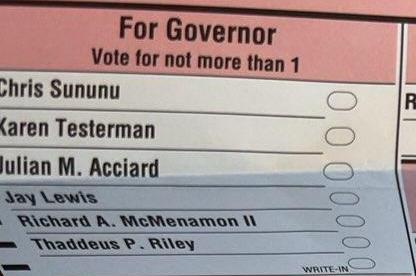Developer Who Tried to Buy Laconia State School Pleads Guilty to Fraud

Robynne Alexander, the real estate developer who offered the state a too-good-to-be-true $21.5 million for the Laconia State School property, pleaded guilty Wednesday to a federal count of wire fraud in the United States District Court in Concord.
Alexander’s business model of offering eye-popping returns to her investors, as much as 80 percent, was actually part of a scheme to stay ahead of her creditors as her real estate empire crumbled, according to court records.
Alexander now faces up to 20 years in prison when she is sentenced at a later date. She’s already agreed to pay more than $3 million in restitution to her dozens of victims. Many of them gave Alexander their entire retirement savings, thinking she would help them make their fortunes.
Alexander presented herself as a California real estate success story when she moved to New England and taught classes as Real Estate Investor Goddess. Alexander showed people how to make big money on large-scale developments, such as apartment complexes, resorts, and even entire village complexes. In reality, she was a small-time player who flipped a few houses before she started teaching.
But someone did learn something in her classes; Alexander learned which of her students to rope in as investors for her various real estate schemes. She launched several different LLCs starting in 2018 using money from her former students, according to court records.
Under her Raxx‑LeMay, LLC., Alexander got investors to back the purchase and redevelopment of two commercial properties in Manchester. But even with her students, Alexander could only come up with $700,000 of the necessary $2 million for the purchase. Instead of giving the money back with interest to her investors, as was the agreement, Alexander bought the properties with investor money from other projects and high-interest loans. In a classic Ponzi-scheme move, Alexander paid returns to some Raxx-LeMay investors with the investor money from other LLCs she controlled.
After that, things took off for Alexander—but not for her investors. She transferred the Raxx-LeMay properties to another LLC, leaving that business and its investors $850,000 in debt and with no assets.
Alexander’s Elm and Baker, LLC., netted $750,000 in investor money to convert a Manchester property into apartments. Instead, Alexander used more than half that money to repay other, unrelated investors and her own personal loans, ultimately leading to foreclosure on the Elm and Baker property in 2023.
Her biggest dream, the $21.5 million Laconia State School development, would have been a resort village with retail. It was the winning bid for the property. But for some reason, Alexander couldn’t close the deal.
Alexander’s winning bid garnered negative attention as people close to the deal began asking questions about her financing. At the same time, one of her failed Manchester developments turned into a lawsuit. Former Gov. Chris Sununu recently said the state gave Alexander multiple opportunities to come up with the money before finally moving on.
“And after three or four extensions, we’re like, ‘Okay, enough is enough.’ And we pulled the plug, rightly so,” Sununu said.
Behind the scenes, Alexander struggled to raise $250,000 from investors for the $21.5 million purchase. At that point, she used $75,000 of that money on herself, including a month-long trip to Paris, Barcelona, Valencia, Nassau, Florida, and New Orleans.
Soon after the Laconia State School deal fell apart, Alexander was under investigation by both the Securities and Exchange Commission and the New Hampshire Bureau of Securities Regulation. As part of an agreement with New Hampshire authorities, Alexander will repay $96,000 to New Hampshire victims. She also agreed to give up any licensing to sell securities anywhere, and agreed not to be head of any company anywhere ever again.
Sununu gives credit to then-Executive Councilor Ted Gatsas (R-District 4) for protecting the state from getting more deeply involved with Alexander during the Laconia property process.
“Gatsas was one of the councilors who said, ‘We could have a problem here,” Sununu said during a recent radio appearance.
As the Alexander deal dragged out, “Ted was just really smart in terms of what we were potentially walking into, and putting up red flags for us. He really drove the message to get the state to pivot. And it was clearly the right thing to do.”





